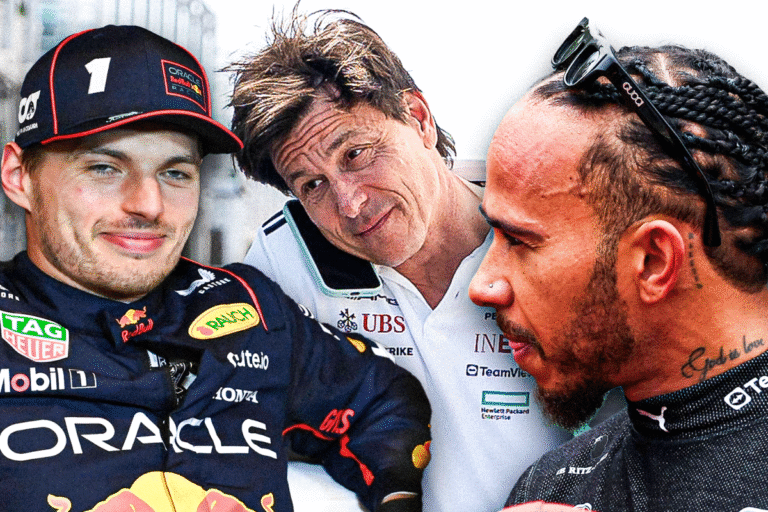F1 News Today: Wolff and Horner partnership plan revealed as Ha…. readmore

In an intriguing development within the Formula 1 landscape, prominent journalist Will Buxton has brought to light the possibility that Lewis Hamilton could depart from Ferrari before the conclusion of his existing contract. This speculation arises amid rumors of a significant personnel change at the iconic team, which has stirred discussions about Hamilton’s future in the sport.
The collaboration between team principals Toto Wolff of Mercedes and Christian Horner of Red Bull Racing is at the forefront of F1 discourse. Their relationship, often characterized by fierce rivalry on the track, appears to be shifting towards a more collaborative effort off it. Recent reports suggest that the two are exploring a partnership strategy that could reshape dynamics within Formula 1, with potential implications for team performance and driver contracts.
Hamilton’s tenure at Ferrari has been a topic of much speculation, especially in light of recent developments. His contract with the Scuderia is reportedly set to run until the end of the 2025 season. However, should the anticipated personnel change occur, it could prompt Hamilton to reconsider his commitment much sooner than expected. Buxton’s insights into this matter have sparked widespread debate among fans and experts alike, as they ponder what such a move might mean for both Hamilton and the legendary Ferrari team.
The crux of the speculation hinges on the rumored restructuring within Ferrari, a team that has long held aspirations of returning to championship contention. Historically, Ferrari’s performance has been closely tied to its management and personnel choices. A pivotal change in key positions could significantly impact driver morale and team dynamics. For Hamilton, who has always been a fierce competitor, the prospect of having to navigate a reshaped team environment may not align with his racing aspirations, particularly as he seeks to clinch more titles before his career concludes.
Mercedes and Red Bull have both set high standards in recent years, consistently challenging Ferrari’s position in the championship battle. The potential partnership between Wolff and Horner may serve as a strategic maneuver in this competitive landscape, reinforcing their teams’ efforts to stay ahead. By joining forces, Wolff and Horner might enhance their respective competitive edges through shared knowledge and innovative strategies, ultimately benefiting their teams on the race track.
As the F1 season progresses, the implications of this emerging partnership could influence not only team performances but also driver decisions. Hamilton’s legacy in the sport is undeniable, with multiple championships under his belt. However, the question remains whether he is willing to remain with a team undergoing significant changes, or whether he sees better opportunities elsewhere.
The landscape of F1 is ever-evolving, with drivers, teams, and management frequently adapting to changes in competitive dynamics. For Hamilton, a decision to leave Ferrari could open doors to new possibilities, perhaps even reuniting with teams where he has previously enjoyed success. The allure of a successful partnership either at Mercedes or elsewhere might be more appealing than navigating the uncertainty of a reorganized Ferrari.
Fans of the sport are left to ponder the future; will Hamilton remain with Ferrari and contribute to its resurgence, or will he make a bold move that will redefine the next chapter of his illustrious career? The next few weeks will be critical, as rumors and reports continue to swirl, providing a fascinating backdrop to the unfolding drama in Formula 1.
Ultimately, the intersection of Wolff and Horner’s potential collaboration and Hamilton’s uncertain future serves to remind us that in F1, every season is punctuated by dramatic twists and turns. The landscape can shift in an instant, and as team principals strategize for the future, drivers must weigh their options carefully.
Beneath the surface of high-speed competition lies a rich tapestry of human emotion, ambition, and strategy. For Hamilton, his legacy and competitive spirit drive him to seek the best environment in which to maximize his performance. The coming months promise to be revealing, as the F1 community closely watches how these narratives converge, setting the stage for what could be a defining moment in the careers of some of the sport’s biggest names.
In conclusion, while Wolff and Horner plot their strategic alliance, Hamilton stands at a crossroads that could alter the trajectory of his career. With early exit decisions looming, the forthcoming weeks will undoubtedly be pivotal in shaping the future landscape of Ferrari and the competitive hierarchy of Formula 1.